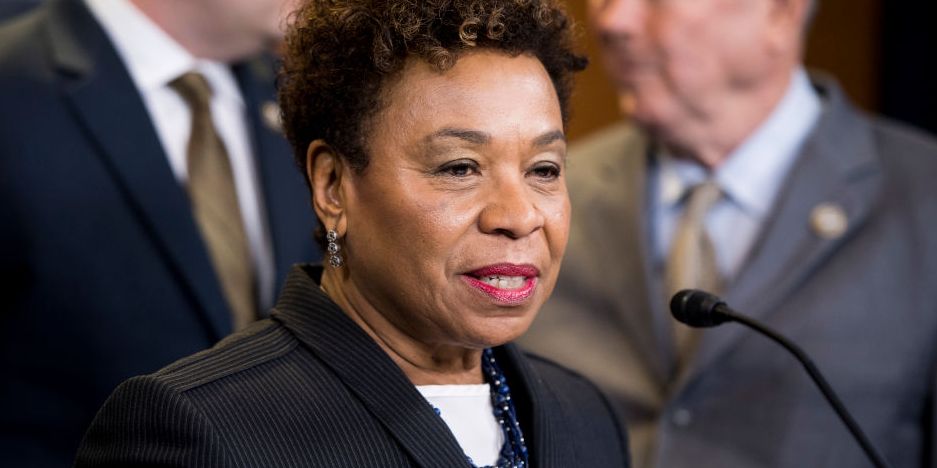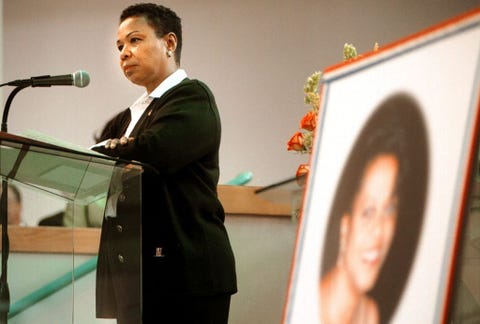Products You May Like
When Kabul fell to Taliban forces in August, the United States ended its 20-year war in Afghanistan right where it started—with the militant group back in power. The devastating conclusion left people in the U.S. distraught, frustrated, and asking the same regretful question: What if Barbara Lee hadn’t been alone?
Back on Sept. 14, 2001, just days after the 9/11 terrorist attacks, the California representative was the only member of Congress to vote against the Authorization for Use of Military Force that allowed the president to use “all necessary and appropriate force” against those determined to have “planned, authorized, committed, or aided the terrorist attacks.” Lee’s decision brought her death threats and hate mail, as people called her a traitor to her country. But she was steadfast. Lee has since worked tirelessly to try and repeal both the 2001 AUMF and another passed in 2002 to authorize military force in Iraq, both of which she has said have been used to wage war far beyond even where it was initially intended.
Now, with the 20th anniversary of 9/11, Lee recounts the days leading up to the defining vote, the moment that helped solidify her decision, and why she’s feeling the same emotions today as she was 20 years ago.
It was early in the morning when we found out something was wrong. I was sitting in the Capitol building on Sept. 11, 2001, having a meeting in the dining room. My staff called and said something very dangerous was happening, and I needed to evacuate. They weren’t sure what, but they told me to get out of the building. At the same time, I heard Capitol police say, “Evacuate. Leave, leave, leave.”
We all ran out, and when I got to the front of the Capitol, I asked the police which way to go. They pointed up Pennsylvania Avenue, so I kept running. The feeling was similar to what I experienced on Jan. 6 being on the floor of the House. I thought, just be focused, be clear-headed, follow directions, and don’t miss a beat. That survival instinct kicks in.
I didn’t know it then, but my Chief of Staff Sandré Swanson’s cousin Wanda Green was a flight attendant on Flight 93. It was later determined that flight was potentially coming toward the Capitol. She and those other heroes took that plane down in Pennsylvania. I think all the time about the what ifs; they truly could have saved my life.
In the coming days, the Democratic Caucus had several meetings to look at the authorization. I spoke about why I thought the authorization would give over the authority to go to war to not only President Bush but any subsequent president. A few members agreed but said this was a national security threat, and we had to be unified regardless. So I talked to more members of Congress. I talked to my mother, my sons, my pastor, my late former boss Ron Dellums, and the late Marcus Raskin of the Institute for Policy Studies. We walked through the pros and cons, and especially with Ron, we talked about the psychology of what was taking place. I really was weighing what everyone said to me. I’ll never forget, I saw one of my former colleagues Eva Clayton, and she looked at me and said, “I know what you’re thinking. You’ve got a lot on your mind. You can see it all over your face.”
On Sept. 14, there was a memorial service, which I almost didn’t go to. I remember telling Elijah Cummings, “This is a really somber moment. It’s tragic. I don’t think I’m going to go to the memorial service, because I want to think more about this.” Then at the last minute, something hit me. I ran to the buses on this overcast, drizzly day and headed to the service.
At the memorial, Rev. Nathan Baxter led a prayer, and he said, “As we act, we not become the evil we deplore.” I wrote it down on the program, and something came over me. I thought, Let the chips fall where they may. This is the wrong authorization. It’s three days after this horrific attack, and we need more time. We need to be rational and strategic. I’m no pacifist; we must bring terrorists to justice. But we don’t do this when we’re in a state of mourning, when we’re grieving for the country and for the families and for the communities that have lost so many people. At that point, I knew. I would vote no.
I got back to the Hill, and the vote was coming up within a few hours. I raced over to the floor and scribbled out some notes on what I was going to say. Then after my speech, the late Henry Hyde, who I never agreed with on anything, the late Tom Lantos, and Steny Hoyer came up to me and hugged me and said some kind words. They said, “We don’t agree with you, but we respect you.” I always think about that; they took the initiative, because they knew what I was going through.
This content is imported from YouTube. You may be able to find the same content in another format, or you may be able to find more information, at their web site.
I’m a person of faith. I studied Dr. Martin Luther King and his insights on war and peace. The Constitution is extremely important to me. And I’m a Black woman in America who has a specific, unique perspective on U.S. foreign policy. Those experiences combined give me a perspective that urges caution whenever violence can occur—to drill down and understand what the implications are, what the unintended consequences could be, and if there’s an alternative to violence. I was brought up in a military family, and my dad, who served in World War II and Korea, was the first person to call me and say it was the right vote.
I always said there was no military solution in Afghanistan, and I’m still firm on that. President Biden was right, and I support his decision to draw down. Our troops have done everything we asked them to do. I’m all for development and diplomacy and making sure we support people throughout the world, but not militarily. But I’m really heartbroken about how this has taken place. I’ve always wanted to end this war and this occupation, but I’ve also said we must have orderly transition.
On the day of that vote in 2001, I was feeling very sad, anxious, and angry, like everybody in the country. And today, I have those same feelings. I’m sad about what’s taking place. I’m angry about what’s happening with the women in Afghanistan as the Taliban comes back into power. I’m worried about the future of women and their lives. I’m sad about how the evacuations began. I wish we had been better prepared for this moment. I’m anxious that we find every single Afghan ally, every individual who helped the U.S., and of course every American citizen, everyone who deserves safe passage out of harms’ way. I’m very focused, just like I was then, on what I can do to help. In many ways, I’m feeling the same emotions as I did 20 years ago on 9/11 and on the floor that day of the vote.
In the Akan language of the Ghanaian people, there’s a mythical bird called Sankofa. It’s a beautiful bird with an egg in her mouth, but her head is turned to the back. The meaning is that in order to move forward—with our young people, with a new day, with new directions—we have to look back. We have to understand the past. We have to know what went right. We have to learn from our mistakes. That’s how we move forward. This, in many ways, is a Sankofa moment for me. Looking back, understanding, learning, and saying, we’ve got to move forward in a better way.
This interview has been edited and condensed for clarity.
This content is created and maintained by a third party, and imported onto this page to help users provide their email addresses. You may be able to find more information about this and similar content at piano.io

